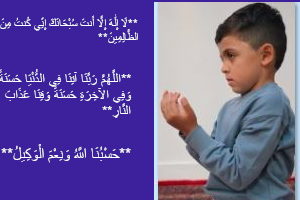In Islam, supplication (dua) is a deeply significant act of worship that allows believers to communicate directly with Allah. It is a means to express gratitude, seek help, ask for forgiveness, and request blessings. Supplications range from personal pleas to universal prayers, and they can be made at any time and place, emphasizing the accessibility and personal nature of this form of worship. Among the numerous supplications mentioned in the Quran and Hadith, certain duas stand out due to their profound meanings and powerful impacts. This article will focus on the dua of Prophet Yunus (Jonah) and the supplications in Surah Al-Baqarah 2:201 and Surah Al-Imran 3:173, highlighting their benefits and significance.
The Dua of Yunus (Jonah)
The dua of Prophet Yunus (Jonah) is one of the most powerful and poignant supplications mentioned in the Quran. Prophet Yunus made this supplication while he was in the belly of the whale, in a state of utter distress and repentance. The dua is found in Surah Al-Anbiya 21:87:
**”There is no deity except You; exalted are You. Indeed, I have been of the wrongdoers.”**
**لَا إِلَٰهَ إِلَّا أَنتَ سُبْحَانَكَ إِنِّي كُنتُ مِنَ الظَّالِمِينَ**
This dua is significant for several reasons:
- **Recognition of Allah’s Oneness**: It begins with the affirmation of Tawhid (the Oneness of Allah), which is the core of Islamic belief.
- **Glorification of Allah**: The phrase “Subhanaka” (exalted are You) glorifies Allah and acknowledges His perfection.
- **Admission of Fault**: Prophet Yunus’s acknowledgment of his wrongdoing is an act of humility and repentance, teaching believers the importance of seeking forgiveness.
- **Divine Response**: Allah responded to this sincere supplication by rescuing Prophet Yunus from the whale, demonstrating the power of dua and Allah’s mercy.
The Supplication in Surah Al-Baqarah 2:201
The supplication in Surah Al-Baqarah, verse 201, is a comprehensive prayer that covers both worldly and spiritual needs:
**”Our Lord, give us in this world [that which is] good and in the Hereafter [that which is] good and protect us from the punishment of the Fire.”**
**اللَّهُمَّ رَبَّنَا آتِنَا فِي الدُّنْيَا حَسَنَةً وَفِي الآخِرَةِ حَسَنَةً وَقِنَا عَذَابَ النَّارِ**
This dua is powerful for its simplicity and all-encompassing nature:
- **Balanced Request**: It seeks Allah’s blessings for both the dunya (world) and the akhirah (Hereafter), ensuring a holistic approach to well-being.
- **Protection from Punishment**: By asking for protection from the Fire, it emphasizes the importance of the Hereafter and the need for divine mercy.
- **Universal Appeal**: This dua is applicable to every believer, making it a timeless prayer for all situations.
The Supplication in Surah Al-Imran 3:173
Another significant supplication is found in Surah Al-Imran, verse 173. This verse reflects immense faith and reliance on Allah:
**”Sufficient for us is Allah, and [He is] the best Disposer of affairs.”**
**حَسْبُنَا اللَّهُ وَنِعْمَ الْوَكِيلُ**
This supplication is particularly powerful in times of difficulty:
- **Trust in Allah**: It exemplifies complete trust and reliance on Allah, encouraging believers to seek His help in all matters.
- **Inner Strength**: It provides psychological and spiritual strength, helping believers remain steadfast in the face of adversity.
- **Divine Support**: By declaring Allah as the best Disposer of affairs, it invites divine intervention and support in resolving problems.
#### Benefits of These Powerful Duas
These supplications offer numerous benefits, making them essential parts of a Muslim’s daily prayers:
- **Holistic Approach**: They address both immediate needs and long-term spiritual goals, ensuring comprehensive well-being.
- **Spiritual Connection**: Reciting these duas strengthens the believer’s relationship with Allah, fostering a deeper sense of faith and reliance.
- **Emotional Comfort**: These prayers provide emotional solace and peace, reducing anxiety and fear by entrusting matters to Allah.
- **Guidance and Protection**: They seek Allah’s guidance and protection, ensuring that believers are under His care and mercy at all times.
Conclusion
Supplications are a vital aspect of Islamic worship, providing a direct line of communication with Allah. Among the myriad of duas, the supplication of Prophet Yunus, and those in Surah Al-Baqarah 2:201 and Surah Al-Imran 3:173, stand out for their profound impact and comprehensive nature. By regularly incorporating these powerful supplications into our prayers, we can seek holistic well-being, strengthen our faith, and find comfort and guidance in all circumstances. Let us make these supplications a regular part of our worship, trusting in Allah’s wisdom and mercy to navigate the challenges of this world and the Hereafter.



